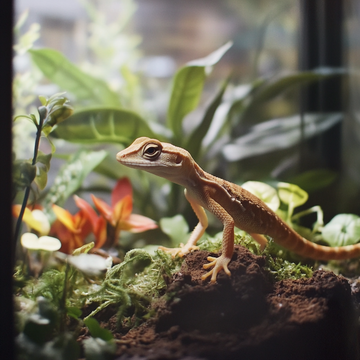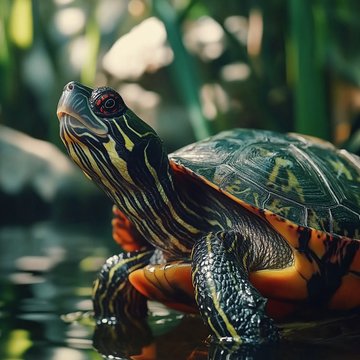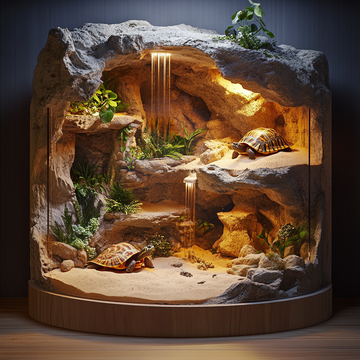Welcome to the fascinating world of reptiles! If you're thinking about getting one as a pet or already have a scaly friend at home, it's essential to understand that these animals have specific needs to stay healthy and happy. One of the most critical aspects of reptile care is proper lighting . In this article, we'll explore why lighting is so vital, how it affects your reptiles, and how you can provide the perfect light environment for your pet.
Why is Lighting So Important for Reptiles?
Reptiles are ectothermic animals, meaning they rely on external sources of heat and light to regulate their body temperature and biological functions. In the wild, they get this primarily from the sun. Sunlight provides:
- Heat : Helps regulate your body temperature.
- UVB and UVA radiation : It is essential for physiological processes such as vitamin D3 synthesis and calcium metabolism.
- Day and night light cycles : Regulate their circadian rhythms and natural behaviors.
Without proper lighting that mimics these natural conditions, reptiles can develop serious health problems, including metabolic bone diseases, loss of appetite, and abnormal behaviors.
Types of Light and Their Impact on Reptiles
1. Visible Light
- Function : Allows reptiles to view their surroundings and exhibit natural behaviors.
- Impact : Adequate lighting highlights the reptile's natural colors and stimulates its activity.
2. Ultraviolet A (UVA) light
- Function : Influences psychological well-being and behavior.
- Impact : Stimulates appetite, activity and reproductive behavior.
3. Ultraviolet B (UVB) light
- Function : It is crucial for the synthesis of vitamin D3.
- Impact : Allows adequate absorption of calcium, preventing metabolic bone diseases.
4. Infrared Heat
- Function : Provides the heat necessary for thermoregulation.
- Impact : Helps in digestion and maintaining proper body temperature.
Consequences of Inadequate Lighting
- Metabolic Bone Disease : Caused by deficiency of vitamin D3 and calcium, leads to weak bones and deformities.
- Lethargy and Lack of Appetite : Lack of adequate light can decrease activity and appetite.
- Reproductive Problems : Without UVA, reptiles may exhibit abnormal reproductive behaviors.
- Stress : An environment that does not simulate their natural habitat can cause stress and aggressive or withdrawn behaviors.
How to Provide Adequate Lighting
1. Research Your Reptile's Specific Needs
Each species has different requirements:
- Tropical Reptiles (eg, iguanas, chameleons): Require high UVB levels and humidity.
- Desert Reptiles (eg, leopard geckos, bearded dragons): Require intense UVB light and high heat.
- Nocturnal Reptiles (eg, nocturnal geckos): Need less UVB but still require light and dark cycles.
2. Choose the Right Lamps
- UVB/UVA lamps : Like Hagen's Repti Glo , available in different intensities (5.0, 10.0) depending on needs.
- Heat Lamps : Bulbs like Heat Glo provide infrared heat without interfering with the light cycle.
- Visible Light Lamps : Sun Glo lamps offer full spectrum light to simulate sunlight.
- Night Lights : Night Glo allows you to observe your nocturnal reptiles without disturbing their natural cycle.
3. Set a Day and Night Light Cycle
- Simulates the natural day-night cycle of its habitat.
- Generally 10-14 hours of daylight and the rest of the time darkness or soft night light.
4. Maintain the Correct Distances and Angles
- Follow the manufacturer's recommendations for the distance between the lamp and the reptile.
- Make sure there are areas with and without lighting so that the reptile can thermoregulate.
5. Replace Lamps Regularly
- UVB lamps lose effectiveness over time (every 6-12 months).
- Mark the installation date and replace as directed.
Additional Tips
- Use Timers : To maintain consistent light cycles.
- Monitor Temperature and Humidity : With suitable thermometers and hygrometers.
- Avoid UVB Barriers : Glass and some plastics filter UVB rays; lamps should be inside the terrarium or in mesh that allows UVB to pass through.
- Consult a Specialized Veterinarian : If you have any questions or health problems.
Providing proper lighting is essential to your reptile's well-being. It not only affects their physical health, but also their behavior and quality of life. By understanding and replicating the conditions of their natural habitat, you'll be ensuring that your pet lives a long and healthy life.
Remember! Every reptile is unique, and taking the time to learn about their specific needs is the first step to becoming a responsible and successful keeper.
Share your experiences!
Do you have any tips or stories about how lighting has affected your reptile? Share in the comments and let's help others learn more about the proper care of these amazing animals! 🐢🐍🦎






